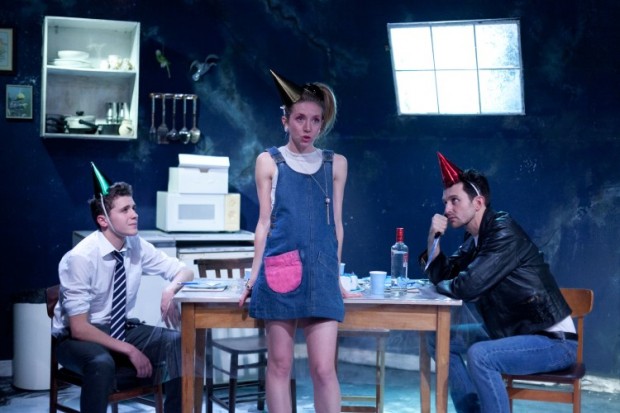You have no items in your cart. Want to get some nice things?
Go shopping
For proof of theatre’s power to shock and appal, you don’t need to look much further than Philip Ridley’s seminal (and multi-award winning) play The Fastest Clock in the Universe. Set in one dingy, claustrophobia-inducing room above an old fur factory and with the entirety of the action restricted to one tense day in the life of its characters, the prospect is enough to make your skin crawl – but also to make you sit forward in your seat and pay attention. And that’s before we’ve encountered the man at the centre of it all: Cougar Glass, a Dorian Gray for our times with an unhealthy obsession with his appearance and a brutal disregard for the feelings of others. But Cougar is a more intricately depicted personality than you might think, and anyway – it’s his birthday, so you’d better be nice.
The Fastest Clock in the Universe may not be a pleasant experience, particularly as it draws nearer to its inevitably explosive conclusion and the unravelling of Cougar’s precariously poised existence gathers pace. But Ridley skilfully draws us into Cougar’s world through the inclusion of Captain Tock, as dishevelled as the flat he has filled with faded portraits of birds and antiques from the shop he presumably used to run and perhaps still does (it’s never made entirely clear). He’s the older, balding man who enables Cougar to survive despite his lifestyle being utterly unsuited to his surroundings – and whose love of winged beasts is matched by the torch he carries desperately for his flatmate. In a dramatic sense, Captain Tock provides balance and reason in the face of Cougar’s decadence and self-absorption: while Cougar loves only himself, Tock is filled with doubt and self-loathing, poignantly revealed during the second act when he finally meets someone who sees through the superficial veil of Cougar Glass.
There’s a strong sense that the first three characters we meet – Cougar, Tock and their elderly landlady Cheetah Bee – are all trapped by their respective self-worth. Cheetah is the one Tock turns to when Cougar has one of his seemingly regular fits of panic and anger at the prospect of being reminded of his true age, and it’s her job to calm him by reminding him that his life is the opposite of hers: “I am at the end, and you are at the beginning,” she emphasises. Actress Ania Marson evokes a contemporary Miss Haversham, in the fur coat that is a hangover from her days as the wife of the factory’s owner. And she has her own grisly tale to tell about the very real cost of beauty. In fact, Ridley’s play is saturated by cultural references to classical tales – it’s there in the names, with Cougar serving as a grotesque twist on Peter Pan and luring in the naive schoolboy Foxtrot Darling (a surname that will surely sound familiar to any J.M. Barrie fans), under the watchful and wary eye of Captain Tock – or should that be Hook? Couple that with the animalistic connotations of Cougar, Cheetah and Fox(trot) and you have a truly savage take on the brutality and cruelty of modern man.
Where Peter Pan taught us that it is possible to stay eternally youthful, Ridley is determined to have Cougar’s plan to be perpetually nineteen crumble around his ears. It doesn’t take much for Cougar’s plot to win over vulnerable, recently bereaved Foxtrot to be ruined. What it takes is Sherbet Gravel. From the moment an effervescent Nancy Sullivan appears (just before the interval), you can tell she spells trouble for our selfish antihero. With a voice as grating and sickly as her name, Sherbet stomps all over Cougar’s lifestyle, and ultimately proves herself to be the ultimate moral voice of truth in Cougar’s world of deceit and decay. Relentlessly forward-thinking, and with a Mary Poppins-esque handbag full of surprises, Sherbet brings life and unstoppable energy into a flat full of dead birds and stifling routine. Sullivan gleefully storms around the stage, clearly relishing a role that has the audience in gales of laughter. Everyone else raises their game accordingly, and the second act is an exhilarating, gut-wrenching experience as a result. Sullivan is definitely one to watch – but, in a cast with no weak links in sight, she’s not the only one. Joshua Blake convinces utterly as the predatory Cougar, giving an intensely menacing performance buoyed by a muscular vigour and intelligence. Ian Houghton subtly gains our sympathy as the most likeable character of the piece, the tragic and forlorn Captain Tock. And Dylan Llewellyn perfectly skewers the mix of bravado and innocence that make up Foxtrot Darling, who discovers too late that his “new friend” is anything but.
All in all, The Fastest Clock in the Universe makes for a surprisingly enjoyable two hours of theatre. This kind of play is not usually my province – but Ridley, and the hard-working cast and crew of this production at the Old Red Lion in Islington, skilfully keep things interesting and certainly shake you up in the process. “Welcome to the abattoir,” says Captain Tock – but this is one show that finds a great deal of life in some horribly grim material.
The Fastest Clock in the Universe runs at the Old Red Lion Theatre until 30th November. See the theatre website for more information, which includes details of post-show events – including Q&As and poetry readings by Philip Ridley himself and a night of five new short monologues on Saturday November 23.

About Michael Reffold
Michael is a graduate of Lancaster University, with a Master's in European Languages and Cultures following swiftly on from a BA in English Literature and Creative Writing. He loves all aspects of theatre – both watching and performing, being a keen amateur actor. He is currently a Senior Editorial Assistant at BioMed Central and a casual duty manager for Theatres Trust.




